Only 10,000 Jews remain in Poland. But today, millions of refugees, Jewish and non-Jewish, are pouring into Poland seeking safety and shelter from the destruction, and brutality of Russia’s unprovoked war on Ukraine. This time, we are here for them.
Our Partners on the Ground
My fly-in to Poland and the Ukraine border was organized by Jewish Federations of North America (JFNA) which coordinates the heroic on-the-ground work of our overseas partners, the American Joint Distribution Committee (JDC), and the Jewish Agency for Israel (JAFI). These two organizations are doing lifesaving work to protect and support Jewish and non-Jewish refugees. Both have been deeply engaged with Jews in Ukraine for more than 75 years. Both have established a strong infrastructure as they work in coordination with each other and with other NGOs in eastern Europe.
For as long as there has been an annual Community Campaign in Atlanta, JAFI and JDC have received significant financial support from us. This support, along with a collective of Federations around the world, has allowed them to build a robust infrastructure that builds the Jewish communities of Ukraine and supports basic needs.
Returning to Warsaw After 20 Years
This is not my first time in Warsaw, Poland. Twenty years ago, I came here to visit the small village, now part of Lithuania, where my grandfather was born. On this unexpectedly warm and bright day, Warsaw impressed me with its combination of modern and historic architecture. There was a surprising calmness to the city, and strangely, it recalled the vibrant Squirrel Hill Jewish community of Pittsburgh where I had the privilege of growing up. My Pittsburgh Jewish community was created by Jews who fled Poland and other parts of Eastern Europe. Still, it is eerie to be in this modern city where parts of the walls of the Warsaw Ghetto still exist.
The reality is that American Jews like me were born in the very best place, at the absolute best time in world history. How stunning now to be a 21st century American visiting a country that is absorbing millions of refugees, most of whom were living quite modern lives just a month ago. That so many of them are Jewish feels like an old nightmare.
In Warsaw, I was nearly hit by a bicycle while absent mindedly walking in the bike lane. I later met the individual who nearly ran me over in a nearby coffee shop and we had coffee together. He let me interview him and I recorded it on my phone. He was a Pole who was hosting refugees in his flat and had many friends doing the same. He was not surprised by the war in Ukraine and said that he knew it was brewing for years. The current situation reminded him of the world’s response to World War II and how long it took the world to wake up to what was happening. He said it was easy to imagine that we were like two people having coffee in Paris in 1939, talking about what was happening in Germany. It underscored the unpredictability of this war and all the possible scenarios that could play out.
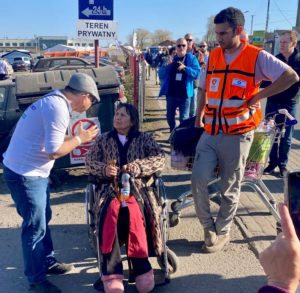
As I walked the streets of Warsaw and neared the central train station, I saw refugees everywhere. Families without fathers were camped out on blow-up beds, resting on benches, eating meals, and getting supplies from temporary tents. Some were passing through and some were trying to settle in Warsaw. The scale of it was heartbreaking.
The Hope of Making Aliyah
On my first evening in Warsaw, I visited a Jewish Agency for Israel processing center set up at a local hotel. Anyone Jewish or related to someone in Israel could come in and learn the required steps to emigrate to Israel. Families of all shapes and sizes were getting the assistance they needed. Thousands had already landed in Israel. It was moving to see the State of Israel living out its mission to be a safe home for all Jews whenever they should need it. At the JAFI center, I heard stories of Holocaust survivors and righteous Gentiles choosing a future in Israel, and stories of people who left in such a hurry they had no documents at all. Here it did not matter. All who wanted to leave for Israel were helped. It was heartwarming to meet the many physicians and trauma counselors, so familiar with the wounds of war and displacement, who had come to help Jews and non-Jews find comfort, safety, and optimism.
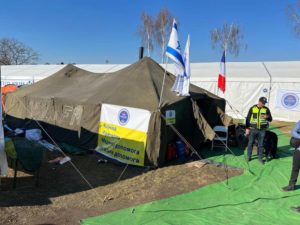
At the Ukraine Border
Arriving at the Medyka border crossing was the emotional crescendo of my trip, where the enormity of this crisis became real. We stopped along the way at another processing center staffed by the JDC and JAFI where we donated more than one ton of relief supplies collected at home. We met many families. Perhaps because I am the father of an adolescent girl, I was most impacted by a mom and her 15-year-old daughter who left their home in Kyiv. Their story, like all the others, was horrendous. They lived in a bomb shelter for weeks and left Kyiv with the little they could carry and their pets. The young girl, Sophia, was withdrawn and distraught and her mom spoke between tears. When the mom finished speaking, she asked Sophia to talk about some drawings she had made. I will never forget how Sophia ran to get one of them and explained how they depicted her emotions and fears, and her dreams and aspirations for peace.
The border felt sacred in unexpected ways. Seeing the JDC and JAFI professionals in uniform alongside the other NGOs, I knew we were doing what we do best. A steady stream of families was coming across the border pushing strollers, pulling suitcases, and looking exhausted. It seemed utterly inhuman to me that all these people, no different than me, had been displaced. Some of them were in wheelchairs or were holding the hands of traumatized children with noticeable special needs. At the same time, I witnessed incredible gemilut chasadim (human kindness) in a way I had never seen before. Our partners were there to accept and embrace traumatized and brave people as they poured across the border. It was a scene I will never forget. The scope of the refugee crisis is immense. And there are literally millions who have chosen to stay or cannot leave Ukraine. What will happen to them?
Like Sophia, I do not and never will understand war. Nobody wins in a war and any life lost is one too many. History teaches us repeatedly that power, ego, and evil are destructive forces. Echoing the words of Anne Frank, I do believe that most people are good. Somehow, we need to fight the Amaleks who appear every generation, who are dedicated to darkness and destruction. I am thankful to be part of a community and a profession that is trying to do whatever it can to help people so terribly impacted by this unnecessary war. I will return to Atlanta from this brief fly-in and commit myself more deeply to do everything I can to help.
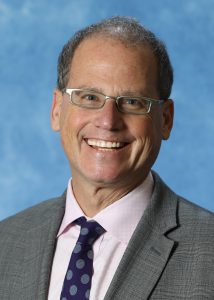
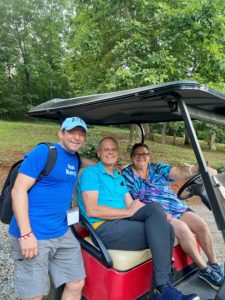 When you think of “summer camp,” what comes to mind? Swimming, singing songs, roasting marshmallows over a fire?
When you think of “summer camp,” what comes to mind? Swimming, singing songs, roasting marshmallows over a fire?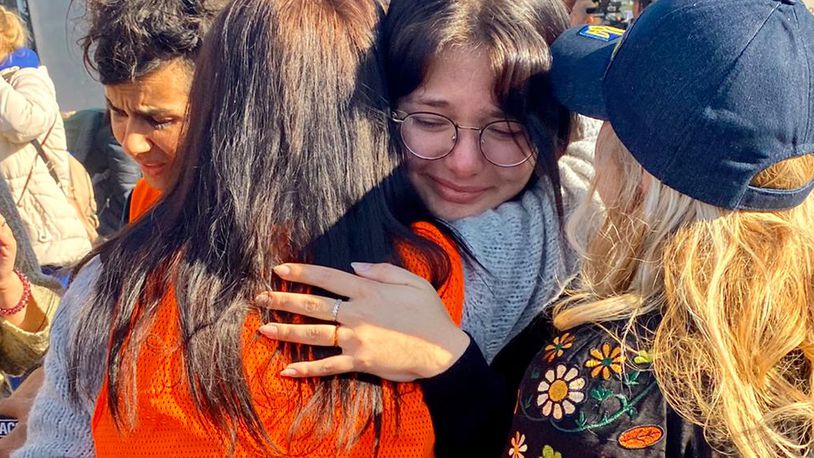


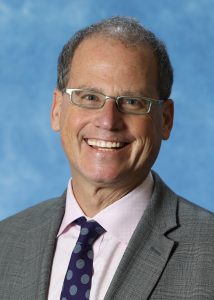 Here comes 2022! I love how the secular new year gives us a chance to revisit the resolutions we wrestled with at Rosh Hashanah. Now, nearly six months later, I am taking a gentle look back at my
Here comes 2022! I love how the secular new year gives us a chance to revisit the resolutions we wrestled with at Rosh Hashanah. Now, nearly six months later, I am taking a gentle look back at my 

